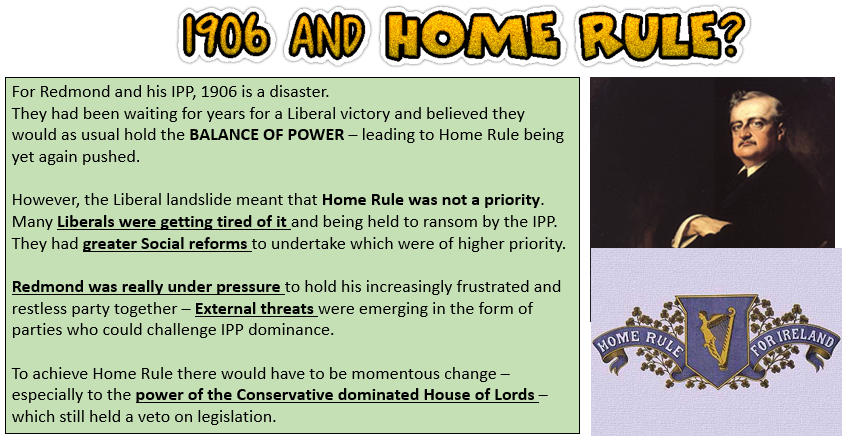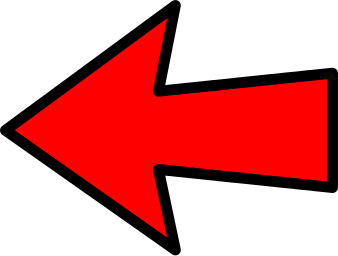The political background to the Third Home Rule Bill
The early years of the 20th century looked bleak for Irish Nationalism and the prospects of Home Rule.
However, in 1906 an election was called! Nationalists sensed this could be their chance - should the Liberals get in - or more importantly should the Liberals need the help of the IPP to gain power! Elections had traditionally been so close between the two big British Parties that the IPP often held the balance of power. If they did hold the balance of Power in 1906 they would surely be able to press for Home Rule!
- The IPP (Irish Parliamentary Party) still nursed deep divisions after the Parnell scandal.
- The Conservative Party had been in power for 10 years. They opposed Home Rule and therefore there was no prospect of it until the Liberals perhaps got into power.
- The Conservatives engaged in a policy of Killing Home Rule With Kindness - pumping investment into Ireland, trying to deal with land issues and generally trying to make the Union workable.
However, in 1906 an election was called! Nationalists sensed this could be their chance - should the Liberals get in - or more importantly should the Liberals need the help of the IPP to gain power! Elections had traditionally been so close between the two big British Parties that the IPP often held the balance of power. If they did hold the balance of Power in 1906 they would surely be able to press for Home Rule!
Many argue that by 1906 the Liberal Party was growing tired of the IPP demands for Home Rule. They regarded it as an issue which was not popular in mainland Britain and one which was splitting some of their party. However. there are others who argue that the Liberals were committed to achieving Home Rule and had demonstrated this through their support for it in other areas of the world and through their general belief that Ireland was indeed a 'nation'
1906 ELECTION RESULTS
In the end the election winner was by far the Liberals. However, Conservative divsions and a strong Liberal Manifesto had created one of the biggest landslide in British Political history! The result of that was that the Liberals did not need the support of any other party to achieve government. They were not reliant on the IPP and therefore they could choose which policies they would follow - and Home Rule would not be a major priority.
reasons behind the liberal victory
where did this result place the ipp and the home rule cause?
To try and placate their IPP allies the Liberals sought to produce some form of move towards Home Rule. This was an Irish Council - However, it was clearly Home Rule - light and was regarded as insulting to the IPP. It was scrapped as an idea. It was to be Home Rule or nothing - However, this would require the support of the Liberals and it would require the veto powers of the House of Lords to be curtailed.
Liberal Prime Minister Campbell Bannerman dies in office and is replaced by Herbert Asquith, a Prime Minister who plays a major role in the Home Rule debate over the years from 1908 onwards. However, his first priority is major Social reforms -an ambition which will lead to lots of potential for the future of Home Rule.
The 1906 Liberal landslide victory leads them towards their greatest aims - social reform. The Liberals believe they can make the UK a much fairer place and that they can do this through welfare reforms - taxing the vastly wealthy in Britain through targeted taxes and using this tax to pay for social reforms to help the enormous amounts of people who are less well off in Britain. This 1909 People's budget is a highly controversial one which will lead to a showdown between the Liberals and Conservatives.
"Is it not a shame that a rich country like Britain should allow people who had toiled all their lives to die in penury?" Lloyd George (Chancellor) explaining his People's budget
"A direct hit on the landowners in the House of Lords"
!The People's budget is pure Socialism. It isn't a budget at all but a REVOLUTION!! Lord Roseberry
|
|
"The day of their reckoning is at hand!"
Lloyd George (Liberal Chancellor) referring to the Lords and Aristocrats
Aristocracy versus democracy
The rejection of the People's budget by the House of Lords was a direct challenge to democracy. It was the first time they had rejected a budget and it would lead to a showdown with the democratically elected House of Commons!
Asquith asked King Edward to fill the House of Lords with up to 500 Liberal Peers in order to get his People's budget passed. Swamping the Lords with Liberals would short circuit the power of the Lords once and for all. However, King Edward VIII,(who was obviously at the top of the aristocratic class) asked Asquith to call an election on the issue
Asquith asked King Edward to fill the House of Lords with up to 500 Liberal Peers in order to get his People's budget passed. Swamping the Lords with Liberals would short circuit the power of the Lords once and for all. However, King Edward VIII,(who was obviously at the top of the aristocratic class) asked Asquith to call an election on the issue
the importance of the parliament act
The greatest outcome from the election of 1910 was that the Liberals can at last get the Parliament Act passed. This restricted the House of Lords - that last bastion of Conservative aristocracy which was creating so many problems in vetoing legislation. Of couse initially it was the People's Budget but this also included - Home Rule.
IMPLICATIONS OF THE PARLIAMENT ACT
|
Although the Parliament Act was intended as a way to ensure that the House of Lords could never again stand in the way of a budget, there were three provisions it contained which had enormous significance for Ireland.
1. DURATION: The maximum duration of any Parliament was reduced from seven to five years. For Home Rule, this meant that Asquith had until the end of 1915 to get the bill through Parliament. 2. REMOVAL OF VETO: The House of Lords could only veto a bill twice. On its third circuit through Parliament a bill would automatically bypass the House of Lords and move to the King for Royal Assent. The removal of the Lords’ veto meant that, with the Liberals and IPP holding a significant joint majority, the bill was sure to pass the Commons. 3. AMENDMENTS: Any bill which was rejected by the House of Lords on its first circuit would have to proceed unchanged in subsequent circuits. This meant that any amendments to the bill would have to be made on the first circuit, before it reached the House of Lords. Any amendments thereafter would make passing the bill on time very difficult and would require separate legislation. |
the third home rule bill
|
Cabinet Committee
|
The Nature of the Bill
Asquith, in 1912, was determined to stick to Gladstone’s principle of Home Rule on an all-Ireland basis. He was reluctant to give in to an “irreconcilable minority” in Ulster who were opposed to Home Rule, given that 4/5 of Irish MPs supported it and Ulster itself had only a slim unionist majority, with 16 Nationalist MPs and 17 Unionist MPs.
The Third Home Rule Bill, introduced on 11 April 1912, had 3 clauses:
Asquith, in 1912, was determined to stick to Gladstone’s principle of Home Rule on an all-Ireland basis. He was reluctant to give in to an “irreconcilable minority” in Ulster who were opposed to Home Rule, given that 4/5 of Irish MPs supported it and Ulster itself had only a slim unionist majority, with 16 Nationalist MPs and 17 Unionist MPs.
The Third Home Rule Bill, introduced on 11 April 1912, had 3 clauses:
- A bicameral (two-house) Irish Parliament would be established in Dublin with powers to deal with most national affairs – a 40 member Senate and a 164 member House of Commons.
- A number of Irish MPs would continue to attend Westminster (42 rather than 103). This would still give Ireland some say in greater imperial policy such as defence or foreign affairs
- Dublin Castle Administration would be eliminated, though with the retention of the Lord Lieutenant.
Progress of the Bill
- 1912 - Passed by the Commons, rejected by the House of Lords.
- 1913 - Reintroduced and passed by the Commons, rejected by the House of Lords.
- 1914 - Reintroduced and passed by the Commons, rejected by the House of Lords.
- The new 1911 Parliament Act was therefore used to bypass the Lords and send the bill for royal assent.
- When it finally reached the Statute Book in September 1914, it was accompanied by a Suspensory Act which postponed its operation. By now, it also included a promise of amending the legislation to make provision for Ulster.

When this Act was passed the Lords could clearly only DELAY a bill for TWO YEARS before it would become law. This would add delay to Home Rule but it would mean that the supposed last obstacle had been removed! But, was it the last obstacle? In the north of Ireland in Ulster many people did not want Home Rule and were determined to resist
|
|
|
|


























